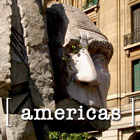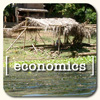
|
HIV CRISIS HITS MIGRANTS RETURNING TO RURAL MEXICO FROM US A new study has shown that the most serious risk rural Mexican women face of contracting HIV is by sexual intercourse with their own husbands, in cases where the husband is a migrant worker traveling to and from the US. The result of the irregular migration policy regarding the US-Mexico border is that men who migrate without papers to work in factories or on farms often spend large amounts of time alone, with no contact with their wives or families. [Full Story] DEVELOPMENT BECOMES A NEW GLOBAL IDEOLOGY Ideologically-driven revolutions have sought to implant Utopian movements where authoritarian regimes once stood, but all too often, they have brought about new authoritarian regimes, which view dissenters as immoral or unthinking pawns of the old regime, and therefore, a universal threat. Now, Foreign Policy magazine has asked the question of whether "development", as an international policy agenda, is becoming the new universalizing ideology, with all the relevant risks. [Full Story] BRAZIL MAP OUTLINES DEVELOPMENTAL SPRAWL INTO AMAZON For the first time, Brazil’s national statistics office (IBGE) released maps detailing the country’s geographical, social and political conditions, which include the human agricultural encroachment into the Amazon region. This could mean the beginning of a real recognition by the state of the toll its development projects are takin the integrity of the region's ecology. [Full Story] FMR CHILEAN DICTATOR, AUGUSTO PINOCHET, DIES AT 91 General Augusto Pinochet, head of the Chilean armed forces, leader of the coup of 11 September 1973, that toppled the government and ended the life of socialist president Salvador Allende, has died. For 17 years, he ruled Chile with an iron fist, nationalized key industries and directed a campaign of kidnap, torture and murder against thousands of dissidents. [Full Story] EX-DICTADOR DE CHILE, AUGUSTO PINOCHET, MUERE A LOS 91 Ha muerto Augusto Pinochet, general de las fuerzas armadas chilenas que el 11 de septiembre del 1973 encabezó un golpe de estado que acabó con la vida y el gobierno elegido del socialista Salvador Allende. Durante 17 años, mandó con mano dura, nacionalizó industrias claves y lideró una campaña de secuestro, tortura y asesinato de miles de disidentes. [Texto completo] OAXACA SCENE OF FEDERALES CRACKDOWN, STRIKERS DISPERSED In hopes of bringing peace and normalcy to strike-ridden Oaxaca, outgoing pres. Vicente Fox ordered 4,600 Federal Preventive Police, airlifted in from the capital, to occupy the city's central square, or Zócalo. The move came after 5 months of smothering general strikes, with a broad coalition of demonstrators demanding the resignation of regional governor Ulises Ruiz and establishing barricades. [Full Story] EX-DICTADOR CHILENO AUGUSTO PINOCHET INTERROGADO POR LAS TORTURAS DE LA VILLA GRIMALDI Cuando Augusto Pinochet lideró el golpe de estado del 11 de septiembre, 1973, que acabó con la vida del presidente Salvador Allende, instituyó un régimen militar que comenzó a detener, desaparecer y torturar a la oposición casi de inmediato. Miles de personas desaparecieron, y sólo ahora, que se le ha quitado el fuero judicial, contra la persecución por crímenes de estado, Pinochet se ve obligado a contestar las preguntas de la ciudadanía y las exigencias de la humanidad. [Texto completo] HA FALLECIDO EL POETA CHILENO GONZALO MILLÁN Conocí a Gonzalo Millán, o para mayor precisión, la poesía de Gonzalo Millán en una antología publicada por el Grupo Trilce de Valdivia; luego creo haber leído otros poemas suyos en una antología de poesía chilena hecha por Alfonso Calderón y publicado por Editorial Universitaria. Año de edición y demás datos no importan al tema de esta nota. Lo cierto es que en ambas antologías, Gonzalo era el último de todos, es decir, el más joven, el más reciente de los poetas que empezaban a mostrarse en la vitrina nacional. El más joven de todos, pero con un lenguaje y una poesía en la que ya podía verse el poeta que llegaría a ser. [Texto completo] BOLIVIA INTENT ON REGAINING ACCESS TO THE PACIFIC After the 1879 War of the Pacific, Chile retained control of coastal territory that had previously been party of Bolivia, leaving the Andean nation landlocked. The nation famous as a symbol of Spanish imperial wealth, for the Potosí silver mines, the richest ever uncovered, would be geographically isolated and would become the poorest nation in South America. [Full Story] CONTROVERSIA Y ENFRENTAMIENTO DOMINAN EN MÉXICO ESTOS DÍAS Ahora que el Tribunal Electoral mexicano ha declarado ganador al candidato del partido reinante, y su principal contrincante progresista ha iniciado un gobierno paralelo, la tensión el enfrentamiento político parecen haber aumentado. Ahora el presidente de Venezuela, Hugo Chávez, ha dicho en una entrevista con CNN que no reconocerá el gobierno del presidente electo, Felipe Calderón. [Texto completo] AT CUBA SUMMIT 50 WORLD LEADERS DISCUSS POLICIES AMONG 'NON-ALIGNED NATIONS' More than 50 heads of state have gathered in Havana, Cuba, for a summit meeting to organize a geopolitical policy that would resist unipolar US control of economic and strategic affairs. The summit is a prelude to the annual meeting of the UN General Assembly in New York, this week. The summit placed strengthening of diplomatic institutions and promotion of economic development in poor regions as priorities. [Full Story] GOBERNAR SERÁ UN RETO PARA EL GANADOR DECLARADO DEL VOTO MEXICANO: FELIPE CALDERÓN La Vanguardia, periódico español, informa que el nuevo presidente electo de México, Felipe Calderón, tendrá un trabajo altamente difícil cuando asume el mando del gobierno. El reto más inmediato es la "insurrección" civil de su contrincante electoral, Andrés Manuel López Obrador, que dice que no sólo seguirá cuestionando la legitimidad de su ascendencia, sino que formará un gobierno paralelo. [Texto completo] TOP MEXICO ELECTORAL COURT TO DECIDE ELECTION TUESDAY Mexico's special court, established to resolve electoral protests in a constitutional process, has announced it will decide what the final official count is for the 2 July balloting, and whether or not the established count is valid. Felipe Calderón currently holds a 240,000 vote advantage in the official tally, and nothing points to the court annulling the election. [Full Story] ALL VOTES MUST BE COUNTED, ALWAYS It is no secret that Mexico's electoral system is undergoing a period of extreme strain and an important test of resilience. While the ruling PAN party's candidate Felipe Calderón enjoys a narrow but contested lead, challenger López Obrador seeks to effect at least a full hand-count of all ballots cast, or a reversal of the election results on the grounds of fraud. The stickiest part of the controversy is what justifies examining only a small percentage of the contested ballots. [Full Story] CASTRO HANDS OVER POWER, TEMPORARILY, TO BROTHER After nearly 5 decades in power, Cuba's authoritarian leader Fidel Castro, has relinquished power to his brother and appointed succesor, Raúl Castro. The move is supposed to be temporary, as a means of providing for a transition should complications arise or recovery be lengthy, after his surgery to correct acute intestinal bleeding. [Full Story] JOURNALIST HOSPITALIZED AFTER FOUR MONTHS ON HUNGER STRIKE Independent Cuban journalist, Guillermo Fariñas Hernández, is now hospitalized in critical condition, after 4 months on hunger strike, which led to his needing emergency surgery. Fariñas has said he would follow through with the hunger strike until the last, facing possibly deadly consequences in hopes of spurring reform that would allow reporters to gather information and to report on and criticize government activities. [Full Story] BACHELET DISMISSES POLICE COMMANDER FOR VIOLENT CRACKDOWN Michelle Bachelet's government has tried to bridge the divide between seizing a unique opportunity to increase spending due to the copper boom and demonstrating the fiscal responsibility she has promised will allow her government to build long-term reforms into Chilean social policy. But her $130 million spending plan does not include a major education-spending increase. High school students have been organizing to call for nationwide increases, saying only with better education is an egalitarian democracy truly possible. [Full Story] THE ILLUSION OF THE DEFINITE & INVASIVE 'OTHER' The identity of groups, or for that matter of individuals is not implacable, nor is it absolutely relative. It follows the vicissitudes of the human health and mind, and requires sincere dialogue with the other in order to reach its fullest potential. The push to establish a single national language can only be sustained on the basis of a number of false premises, all of which work against the interests of both a democratic society and American tradition itself. [Full Story] BACHELET OUTLINES BROAD NEW SOCIAL SPENDING, BACKED BY STATE COPPER PROFITS Michelle Bachelet, Chile's first female president, has faced opportunity, temptation and regional economic upheaval, and she is showing signs of following the wisest course, while staying faithful to her pledges. In her first state of the nation address, the new president has said she will use windfall state profits from the inflated copper markets to fund social programs, but without relaxing her policy of strict fiscal discipline. [Full Story] BUSH PRESENTA CINCO PUNTOS A FAVOR DE LA REFORMA MIGRATORIA Anoche, George W. Bush presentó desde su despacho en la Casa Blanca, un plan de cinco puntos claves para una "reforma comprensiva" de la política migratoria de Estados Unidos. El plan incluye despachar 6 mil soldados de la Guardia Nacional a la frontera con México y un carnet biométrico para los inmigrantes, pero también moderó su retórica, recordando que "todo ser humano tiene valor y dignidad, a pesar del estatus de sus papeles de ciudadanía." [Texto completo] EL GRAN BOICOTEO POR LOS DERECHOS MIGRATORIOS Hace 230 años, los colonos revolucionarios de la costa atlántica de Norteamérica exigieron a la corona británica que no hubiera "ningún impuesto sin representación" en el parlamento de Londres. El movimiento a favor de una política migratoria más humana, sensata y democrática, evoca esa ideología: la persona tiene derecho a una representación en una economía que incluye su mano de obra. [Texto completo] BACHELET TAKES OFFICE, CHILE'S FIRST WOMAN HEAD OF STATE Michelle Bachelet, winner of Chile's recent presidential election, has been sworn in and has taken power as the nation's first woman president. She inherits the economic legacy of fellow socialist, outgoing pres. Ricardo Lagos, who leaves surpluses in government revenue, a rapidly expanding economy and a well-functioning balance between free market policies and expansive social programs. [Full Story] PRÉVAL DECLARED WINNER IN HAITIAN ELECTION René Préval will be the next president of Haiti. After a week of violent protests and allegations of "massive fraud", with the candidate calling for peace and responsibility from supporters and an investigation into manipulations, the government of interim president Boniface Alexandre has declared Préval the winner of the 7 February elections. [Full Story] CHILE ELECTS FIRST FEMALE PRESIDENT Michelle Bachelet has a long and turbulent political biography. She and her mother were kidnapped and tortured by the Pinochet government, after her father was murdered for his political affiliation with the Allende government. They were forced into exile by the military regime and Bachelet has worked to restore democratic principles to Chilean government. Like Ricardo Lagos before her, she is a moderate socialist, intent upon leading Chile's governing center-left coalition, while continuing free-market policies, evening the wealth divide. [Full Story] ARGENTINA CALLED ON TO INVESTIGATE ATTACKS ON JOURNALISTS Amnesty International says the government of Argentina needs to investigate threats of violence against journalists during the period of economic collapse, up through present day investigations into past abuses of police and military forces. The Asociación en Defensa del Periodismo Independiente - PERIODISTAS) reported in 2002 that attacks against journalists in Argentina were 15 percent more frequent than during 2001, a worrying escalation in so short a time. It is these reports of violence and harassment, that should be investigated, according to the report. [Full Story] ARISTIDE RELINQUISHES POWER Haiti's first and only elected president, Jean-Bertrand Aristide has relinquished power in the midst of a violent uprising which has become the country's 33rd coup. He reportedly left the capital for the Dominican Republic, to fly on to another country. Observers now fear chaos and a brutal power struggle, as the forces arrayed against Aristide had included both political factions formerly loyal to Aristide, as well as paramilitary bands linked to the 1991 military coup and the notorious death squads of the early 90s. [Full Story] HAITIAN REBELS ALIGN WITH EXILED DICTATORS' ASSOCIATES As pressure increases for Aristide to resolve the crisis, demonstrators marched in Port-au-Prince on Sunday. Due to past military dictatorships, Haiti has no military, and only 3,500 to 5,000 police officers, limiting the government's ability to maintain security. Rebels attacked another town today, killing the police commissioner. New reports suggest the rebels occupying Gonaives have "aligned with exiled figures associated with a past coup attempt and Haiti's last military dictatorship". During most of the crisis, opposition leaders have refused to negotiate with Aristide. [For more: AJC] ARISTIDE SEEKS TALKS TO EASE TENSIONS Haitian President Jean Bertrand Aristide has agreed to meet with opposition leaders at talks to be arranged by the Carribean Community. Recent reports had indicated that the opposition would not meet with Aristide under any circumstances, that only his resignation would interrupt the street violence and general obstruction of Haiti's affairs. It is unclear whether opposition groups would agree to meet. [For more: Cape Argus] ARISTIDE UNDER ATTACK FOR REPRESENTING MAJORITY POOR The non-partisan, non-profit Council on Hemispheric Affairs, after investigating events on the ground in Haiti, has released a memorandum citing "unfair and indecent diplomacy" as key to the ongoing political tension. The report notes systematic unwillingness by the well-financed opposition to enter a legitimate democratic process, and Washington's continued opposition to sending aid to the hemisphere's poorest country, as part of what appears to be a return to policies that restored the Duvalier dictatorship in 1991. [Full Story] SUMMIT OF THE AMERICAS HIGHTLIGHTS DIVISIONS The summit ended today with some headway for US plans for the Free Trade Area of the Americas. A deadline for 1 January 2005 was set for implementation of the plan. Leaders from the two largest economies in South America, however, Argentina and Brasil, have opposed the agreement, saying it will increase poverty and deprivation in their countries. The US has pursued bilateral free trade agreements with individual countries throughout the hemisphere, in order to lay the framework for the controversial FTAA. Another sensitive issue was the fingerprinting of Latin American nationals entering the US. President Bush won approval from México's President Vicent Fox for his proposed visiting worker program. [For more: ABC] MAJOR COLOMBIAN DRUG SUSPECT CAPTURED Arcángel de Jesús Henao Montoya was arrested by Panamanian police near the Colombian border. Henao Montoya is among the suspected drug traffickers wanted by the US government. The Drug Enforcement Agency reportedly aided the Panamanian officials in making the arrest. The BBC reports that Mr. Henao Montoya and two other suspected kingpins had previously offered to surrender to Colombian officials in exchange for a guarantee not to be extradited to the US. ARISTIDE FACING HOSTILITIES IN PORT-AU-PRINCE Jean-Bertrand Aristide, the former Catholic priest and community activist who rose to power in opposition to the infamous Duvalier family dictatorship, is facing protests in the streets of the Haitian capital. The crowds chanted slogans calling for Aristide to "Go", but the President enjoys strong support in the rural areas, where as much as 80% of the population resides, and where his support is buoyed by allegiance from the nation's poor. Aristide was deposed in a violent coup by pro-Duvalier forces, shortly after beginning democratic reforms, but was then restored with American support during the 1990's. He reportedly plans to hold free elections this year, and to foment reforms to benefit the poor. [Full Story] BRAZIL TO FINGERPRINT VISITING AMERICANS In direct response to new laws regarding Brazilian citizens entering the United States, the Brazilian government has imposed security restrictions for Americans entering Brazil. Americans will now be required to be fingerprinted, and to carry an entry visa, provisions which mirror new provisions imposed on Brazilians who visit the US. [For more: Seattle Times] BRAZIL'S NUCLEAR QUESTION Brazil has announced that it intends to be one of the nations producing enriched uranium, a nuclear fuel, and that it plans to export the product as an energy resource. The Brazilian government says it has no WMD aspirations and that the program is entirely peaceful, driven by economic opportunity. Brazil has the world's sixth largest uranium deposits, and says it would produce enriched uranium far short of "weapons grade". Brasília has resisted plans for "spot inspections" of its nuclear-fuel generation facilities. The government maintains that as a peaceful nation, Brazil should not be subject to the same aggressive scrutiny as problematic "rogue states". [Full Story] FTAA OBSTACLES SHOW AT MIAMI MINISTERIAL MEETING The United States wants to fashion a Free Trade Area of the Americas agreement which is comprehensive, hemispheric and lasting. The public in many countries is increasingly skeptical about the benefits of such an agreement. Agricultural subsidies in developed countries can pose significant barriers to agricultural prosperity in developing nations. Argentina and Brazil in particular demand that there be an arrangement through which countries adversely affected by such policies would receive compensation or special consideration in bilateral agreements. Ambassador Ross Wilson, chief American negotiator for the FTAA, addressing the Center for Strategic and International Studies, yesterday, noted that recent free trade meetings in Cancún and Miami could be viewed as setbacks to the liberalization of trade throughout the hemisphere. Argentine Ambassador to the US, José Bordón, noted his hopes that Miami would have been a great "opportunity to speak frankly" about the nature of trade relations and the need to consider the difficulties of domestic economic considerations in many countries. [Full Story] LATIN AMERICA STRUGGLING BEHIND THE VEIL The Center for Economic and Policy Research has published a study of economic trends in Latin America during the time of liberalized trade policy. Their research determined that growth has been hampered by liberalized trade policies which favor wealthy nations. The study stems from concerns that slow growth in the first years of this century may mirror trends from the 1980's, known to analysts of Latin American economics as "the lost decade". Overall Latin American economic growth in the 1980's languished at -0.3%, marking a decline in prosperity and in GDP. [Full Story] BOLIVIAN PRESIDENT RESIGNS, PARLIAMENT APPROVES Bolivia's embattled President Gonzalo Sánchez de Lozada resigned yesterday, in the wake of violent protests and demonstrations that rattled the country for weeks. The president delivered his resignation to the parliament for consideration, the parliament voted to approve the resignation, allowing the vice president to complete the term which lasts until 2007. It is estimated that 74 people were killed in violent clashes between anti-government protesters and state police during the month leading up to the resignation. [Full Story] |
|||||||||||||||
|
||||||||||||||||












